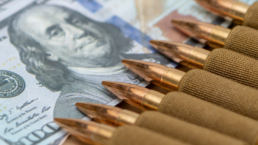Joe Biden, the National Security State, and Arms Sales
By William D. Hartung, Tom Dispatch
Here’s a seldom commented-upon reality of this century and this moment: the United States remains the number-one arms-exporting nation on the planet. Between 2017 and 2021, it grabbed 39% of the total global weapons market and there’s nothing new about that. It has, in fact, been the top arms dealer in every year but one for the past three decades. And it’s a remarkably lucrative business, earning American weapons makers tens of billions of dollars annually.

It would be one thing if it were simply a matter of money raked in by the industrial half of the military-industrial complex. Unfortunately, in these years, U.S.-supplied weaponry has also fueled conflicts, enabled human-rights violations, helped destabilize not just individual countries but whole regions, and made it significantly easier for repressive regimes to commit war crimes.
At first glance, it appeared that Joe Biden, on entering the White House, might take a different approach to arms sales. On the campaign trail in 2020, he had, for instance, labeled Saudi Arabia a “pariah” state and implied that the unbridled flow of U.S. weaponry to that kingdom would be reduced, if not terminated. He also bluntly assured voters that this country wouldn’t “check its values at the door to sell arms.”
Initially, Biden paused arms deals to that country and even suspended one bomb sale. Unfortunately, within eight months of his taking office, sales to the Saudi regime had resumed. In addition, the Biden team has offered arms to a number of other repressive regimes from Egypt and Nigeria to the Philippines. Such sales contrast strikingly with the president’s mantra of supporting “democracies over autocracies,” as well as his reasonable impulse to supply weapons to Ukraine to defend itself against Russia’s brutal invasion.
Recent Posts
Politicians Are Betraying Gen Z On Climate
July 10, 2025
Take Action Now While Gen-Zers thrift, knit, crochet, and find other ways to reduce our footprints, Trump and the GOP are greenlighting more climate…
Trump’s Deportation Threat Against Zohran Mamdani Is Shameful
July 10, 2025
Take Action Now In only half a year of Donald Trump’s presidency, he and his allies have turned deportation into an explicitly political threat…
Teachers Union Votes To Cut Ties To The Anti-Defamation League
July 10, 2025
Take Action Now In a momentous vote, the National Education Association voted to cut all ties with the Anti-Defamation League. The reason? “Despite…
2025 War Abolisher Awards Go To Albanese, Nader, Waters
July 9, 2025
Take Action Now The purpose of the awards is to honor and encourage support for those working to abolish the institution of war itself.By World…




